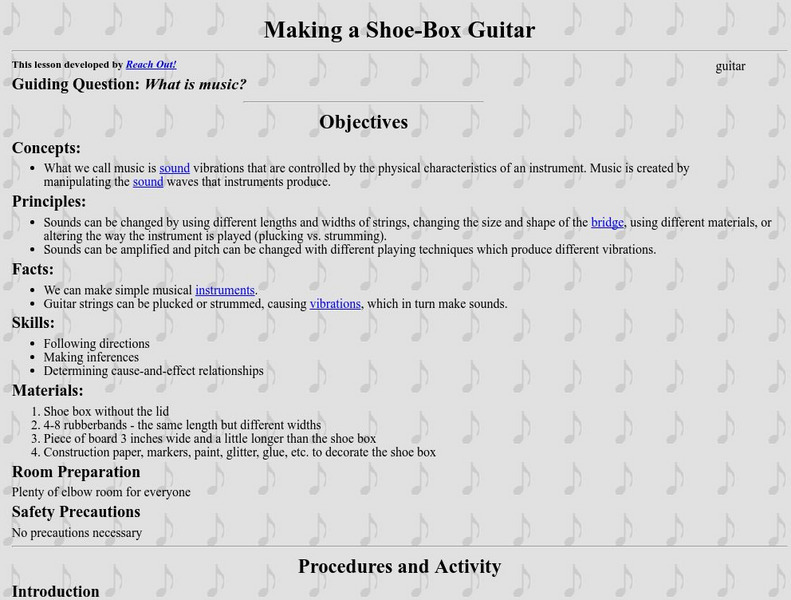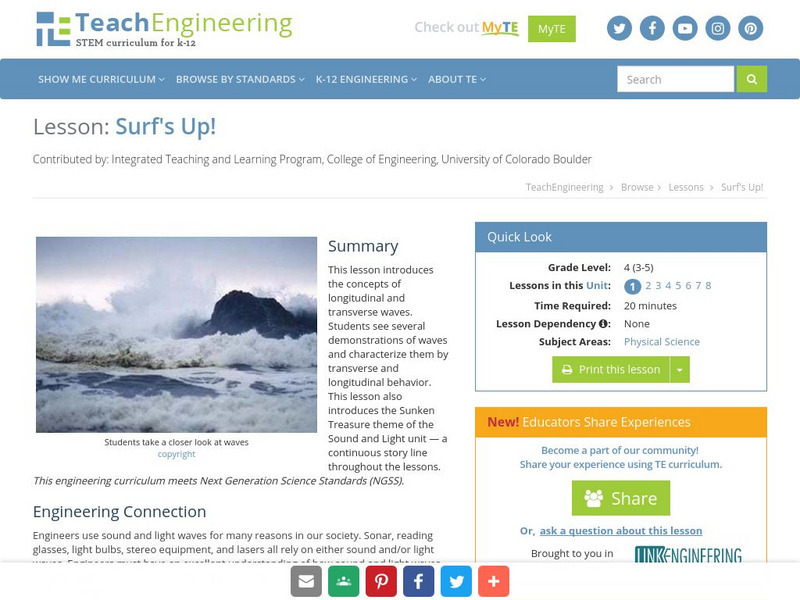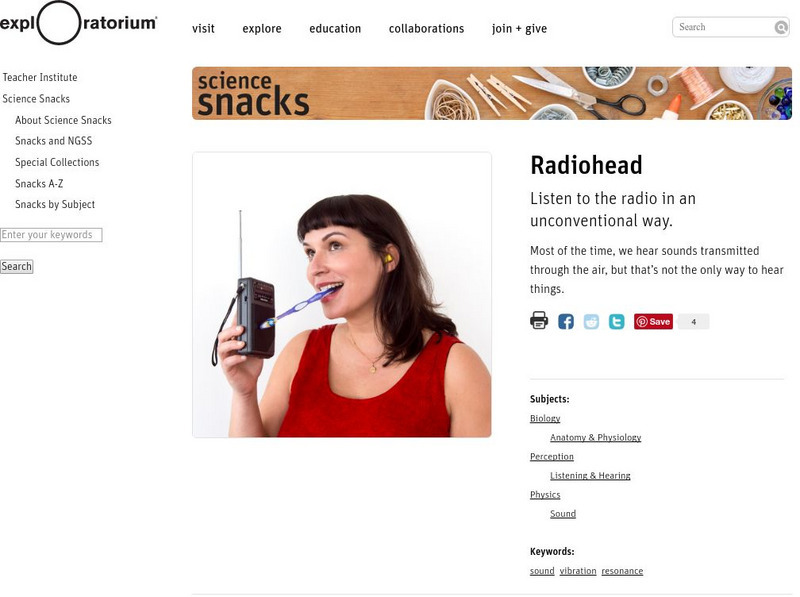Sophia Learning
Sophia: Wave Interference: Lesson 2
This lesson will discuss the differences in constructive and destructive wave interference. It is 2 of 2 in the series titled "Wave Interference."
Open Curriculum
Open Curriculum: Standing Waves and Wind Instruments
To explain how musical sounds in aerophones are created by standing waves
Georgia State University
Georgia State University: Hyper Physics: Auditorium Acoustics
Home page for a hypertext physics course on auditorium acoustics and acoustical design.
Science Fun for Everyone
Science Fun: Balloon Speakers
Learn about sound waves with this science experiment. All you need is a balloon!
Cosmo Learning
Cosmo Learning: Richard Feynman Lecture on Nanotechnology: Tiny Machines
A video lecture from Dr. Richard Feynman exploring tiny machines. Webpage breaks down the lecture into twelve segments. Videos vary in length and explain the science behind nanotechnology. Understand computer chips, sound waves, and the...
Science Education Resource Center at Carleton College
Serc: Mn Step: Working With a Handmade Oscilloscope
For this activity, students use an oscilloscope to explore the behavior of sound waves.
PBS
Pbs Teachers: String Telephone
Discover how sound vibrations travel across a string by making a telephone from paper cups, string and paper clips.
Georgia State University
Georgia State University: Hyper Physics: Resonance
This hypertext physics course surveys sound resonance in musical instruments. Illustrated.
BBC
Bbc: Bitesize: Gcse: Physics: Reflection and Refraction
All waves will reflect and refract in the right circumstances. The reflection and refraction of light explain how people see images, color and even optical illusions. This tutorial discusses each concept and presents an experiment to try...
Other
Univ. Of Leicester: Amplitude of Vibrations and Loudness
Discusses the ear drum receiving vibrations and how the amplitude of those vibrations translates into the loudness of the sound. Good diagrams to illustrate this concept.
PBS
Pbs: The Music Instinct: Good Vibrations! [Pdf]
Using the program "The Music Instinct," available on the PBS website, students will explore the nature of sound vibrations over two class periods.
Physics Aviary
Physics Aviary: Resonance Tube Lab
This lab is designed to help students visualize the formation of standing waves in a wind instrument. Students will be able to view fundamental waves as well as some higher harmonics. They can work with a tube with two open ends or just...
Smithsonian Institution
Lemelson Center: Spark!lab: Invent a Musical Whirligig
Students can easily create a musical whirligig to study sound production. These instruments are constructed out of everyday materials and allows students to use their imagination to make music.
Physics Aviary
Physics Aviary: Doppler Lab
This lab is designed to have students investigate the changes to wavelength and frequency that occur when the source of the waves is in motion. This video describes the lab: https://youtu.be/eCceYPBR6f4
Read Works
Read Works: Now Hear This
[Free Registration/Login Required] An informational text about high-pitch sounds that can be heard by children but not by adults. A question sheet is available to help students build skills in understanding cause and effect.
University of Maryland
Thinking Problems in Oscillations and Waves
A series of thought-provoking, multichoice questions from the University of Maryland on the topic of oscillations and waves. Equations for calculating the period of motion for masses on springs, pendulums, sounds, and waves on a string...
Michigan Reach Out
Michigan Reach Out!: Making a Shoe Box Guitar
This site provides an experiment where students create a guitar to discover what variables will change sound.
Canada Science and Technology Museum
Canada Science and Technology Museum: Materials
Test your skill and find out which materials absorb sound well.
Science Bob Pflugfelder
Science Bob: Make a Simple Duck Call!
Contains a procedure for using a plastic straw to create a device capable of producing a duck call when air is passed through. The site introduces the concept of vibration in sound production.
TeachEngineering
Teach Engineering: Surf's Up!
This lesson introduces the concepts of longitudinal and transverse waves. Students see several demonstrations of waves and characterize them by transverse and longitudinal behavior. This lesson also introduces the Sunken Treasure theme...
TED Talks
Ted: Ted Ed: The Sonic Boom Problem
Objects that fly faster than the speed of sound create a shock wave accompanied by a thunder-like noise: the sonic boom. These epic sounds can cause distress to people and animals and even damage nearby buildings. Katerina Kaouri details...
Creative Science Centre
Creative Science Centre: Mini Light Beam Receiver
A very simple device to convert light into sound can be made by wiring a solar cell directly to headphones (or an earpiece). The solar cell converts light into electricity and the headphones convert electricity into sound. The limitation...
Exploratorium
Exploratorium: Science Snacks: Radiohead
Try this experiment to see how sound transmits as vibrations through solid matter. You will use a toothbrush to listen to the radio.
ClassFlow
Class Flow: Sound Review
[Free Registration/Login Required] How does sound travel and what parts of the ear detect sound best? Using multiple websites, students discover animals that make the loudest sounds, which tapped glass will create the highest pitch, what...
Other popular searches
- Light and Sound Waves
- Sound Waves & Music
- Physics Sound Waves
- Sound Waves Physics
- Worksheet Sound Waves
- Light & Sound Waves
- Speed of Sound Waves
- Sound Waves Amplitude
- Vibration and Sound Waves
- Sound Waves and Guitars
- Sound Waves Webquest
- Light Sound Waves


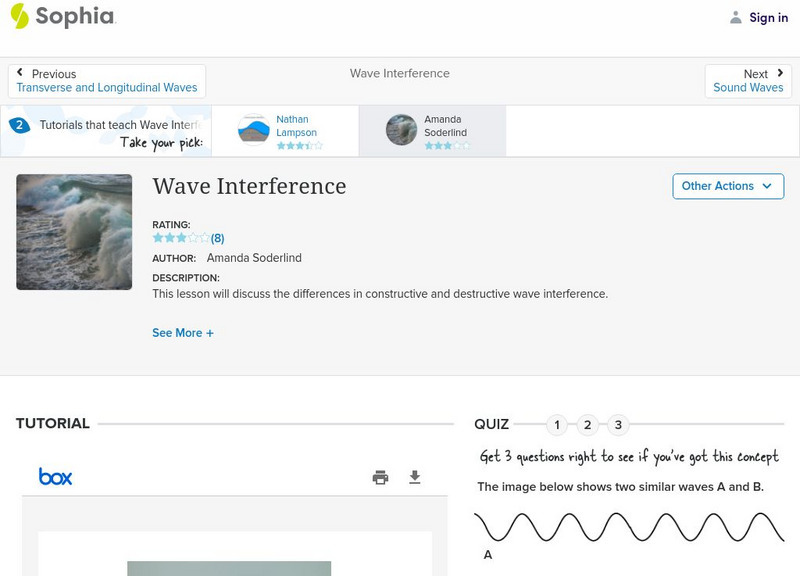

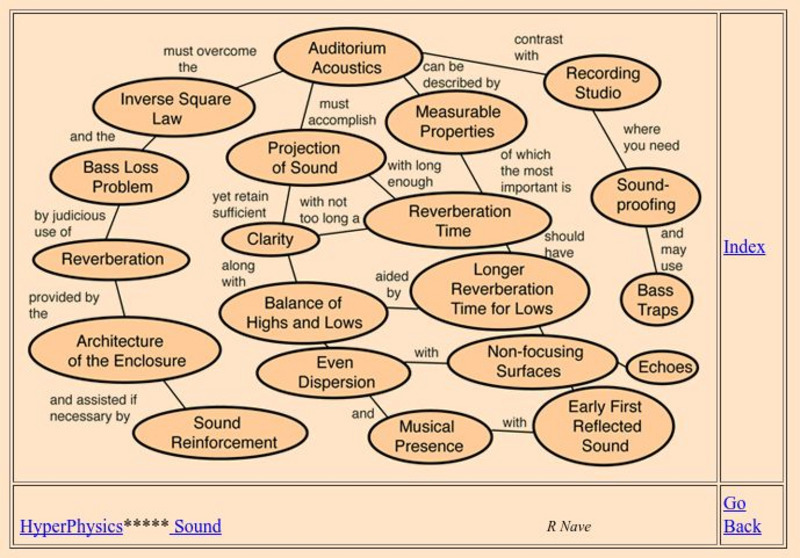





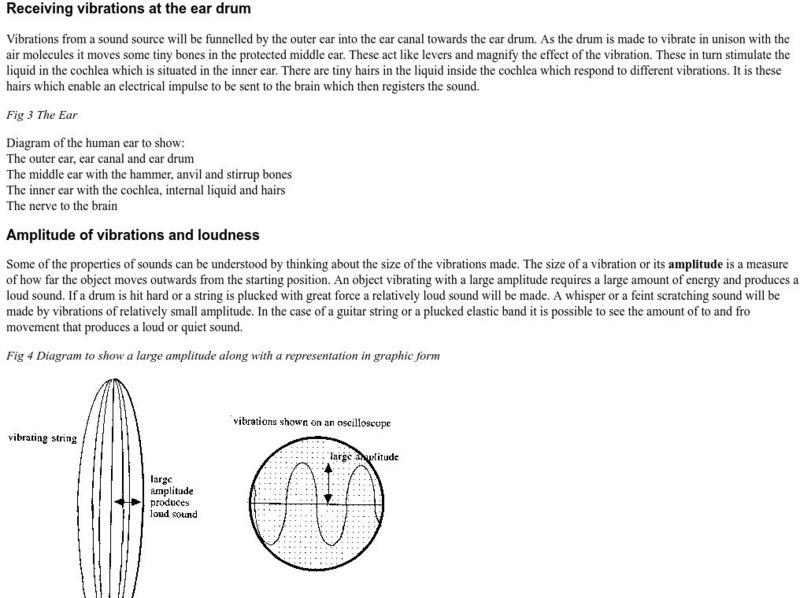
![Pbs: The Music Instinct: Good Vibrations! [Pdf] Lesson Plan Pbs: The Music Instinct: Good Vibrations! [Pdf] Lesson Plan](https://content.lessonplanet.com/knovation/original/32599-2e1d15a712acffd6c74d979ac6bcf592.jpg?1661522343)


